Thresholds and Tensions: Unmasking Public Unease with Canada’s Immigration Goals
From November 9 to 12, 2023, Abacus Data conducted a national survey of 2,000 Canadians (18+) to assess their perceptions of immigration in Canada today. In this survey, we explored public perspectives shaping the national dialogue on immigration and compare results from a similar survey we conducted in July 2023.
The results indicate that public concern about Canada’s immigration targets as concerns about housing, healthcare capacity, and growth overwhelm the perceived benefits of immigration.
AWARENESS AND TARGETS
As Canada prepares to welcome almost 500,000 new immigrants in 2024, the results reveal a notable lack of awareness among Canadians regarding the current immigration targets. Specifically, only 31% of Canadians are informed about the immigration targets set for 2024. Half of Canadians believe that Canada will welcome fewer than 200,000 immigrants in the upcoming year. These findings underscore a widespread lack of awareness regarding the volume of new immigrants Canada is expecting to welcome in 2024.
Two in three Canadians (67%) believe the current immigration target is too high, increasing by 6-points increase since July. More disconcerting is the fact that 2 in 5 Canadians deem the anticipated number of new immigrants as “way too high,” with only 2% considering it too low. These findings emphasize a mounting concern regarding Canada’s immigration targets.
There is a correlation between age and perspectives on immigration targets, as older Canadians (60+; 74% and 45 to 59; 71% consider it too high) are more likely to think the target is too high compared to their younger counterparts (18-29; 54% consider it too high). Additionally, political affiliations play a substantial role, with 82% of Conservative Party voters in the last federal election thinking the target is too high, 20-points higher than Liberal Party voters. Nevertheless, despite the difference in opinion across the political spectrum, a majority of all party supporters think the current immigration target is too high, suggesting a cross-partisan consensus is forming.
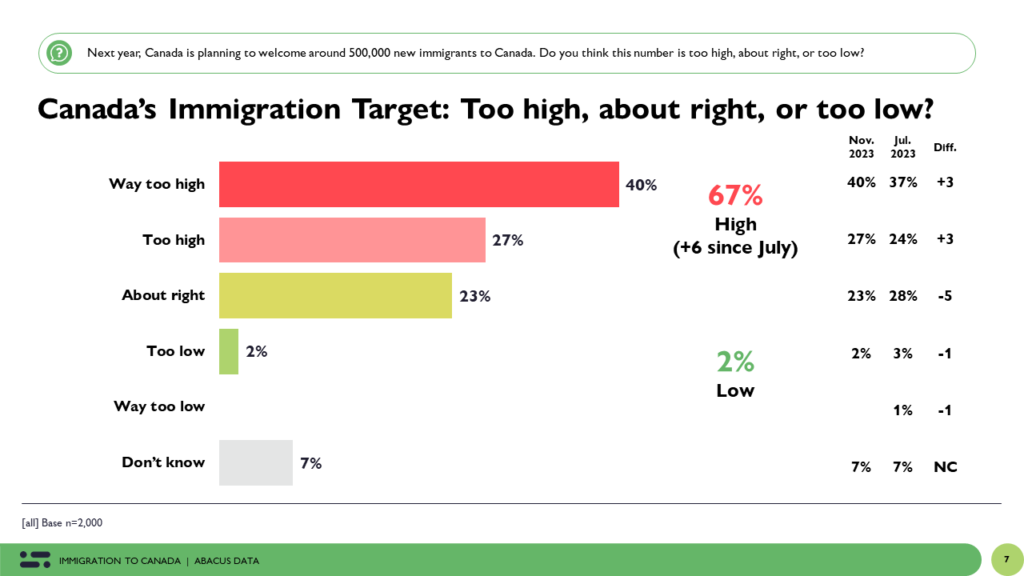
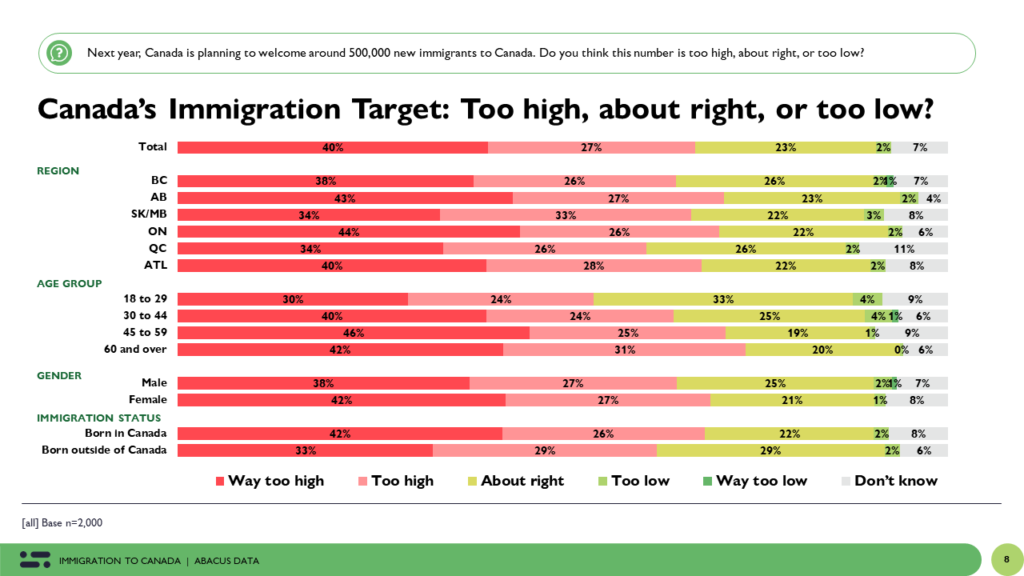
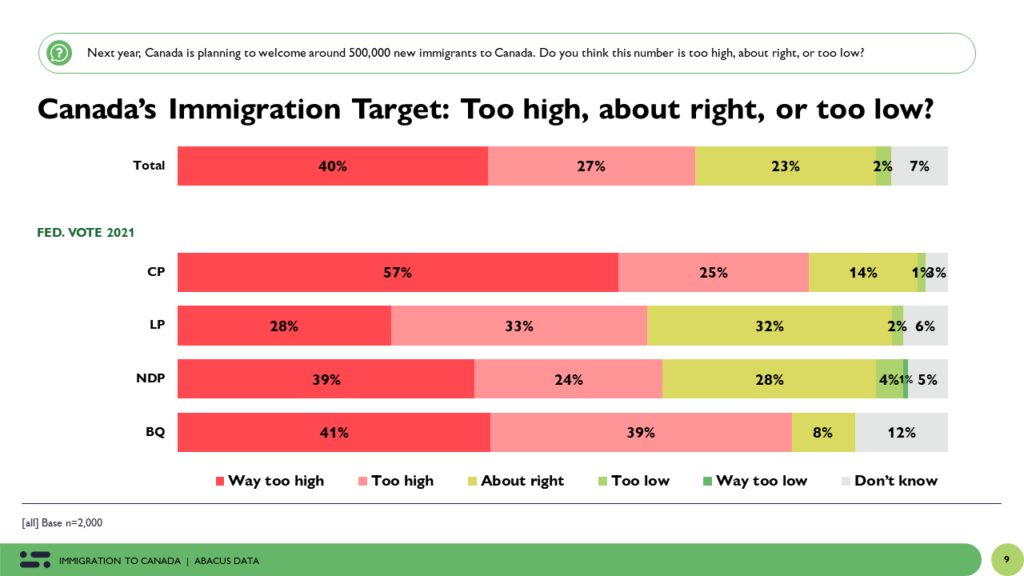
COMMUNITY GROWTH AND NEEDS
Most Canadians believe the immigration population in their community is growing – with about 4 in 10 thinking it is growing significantly (up from 35% in July), while 23% note a moderate rise (slightly down from 24% in July) in immigration. Overall, this suggests that 3 in 5 Canadians believe that the new immigrant population in their communities is growing (moderately to significantly).
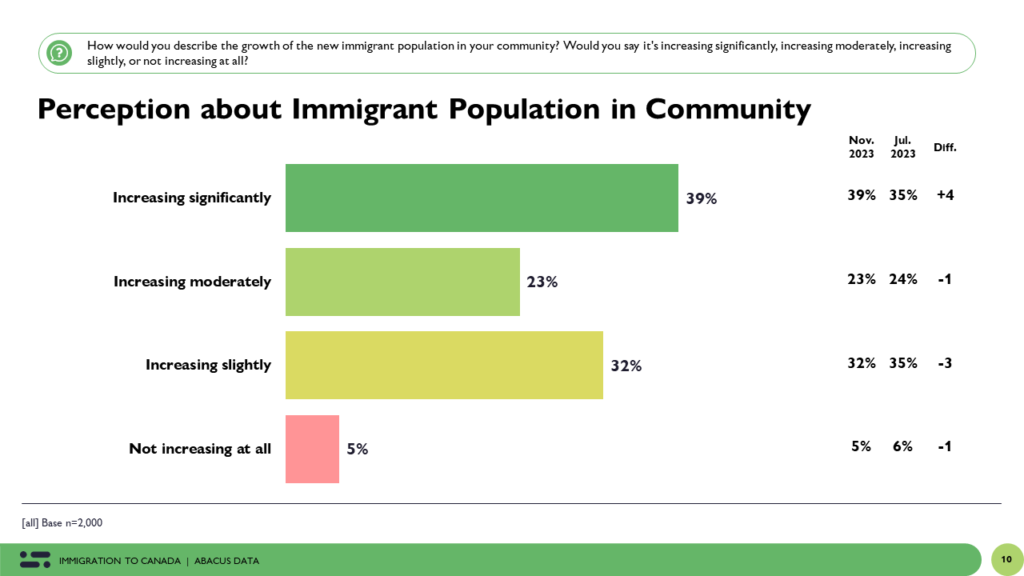
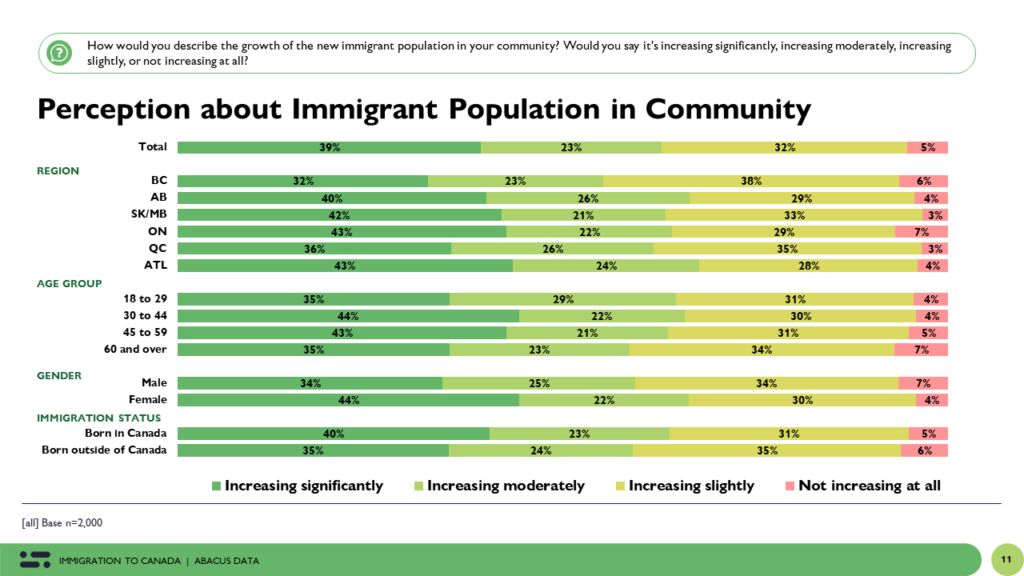
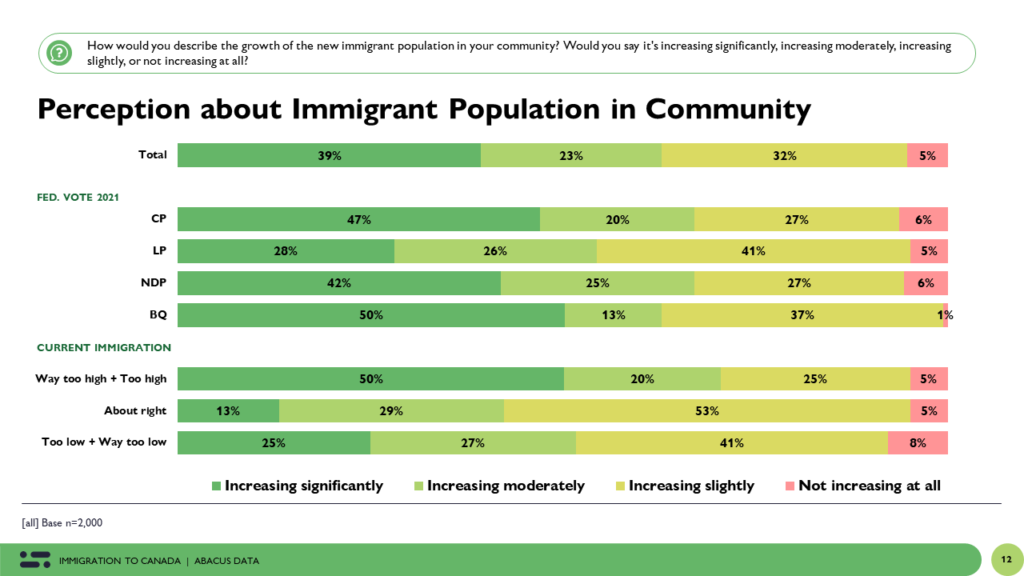
Introducing Abacus Data MRP A game-changing tool for GR, advocacy, and digital campaign targeting. A must for anyone in GR, campaigning, advertising, digital public affairs
Find out more
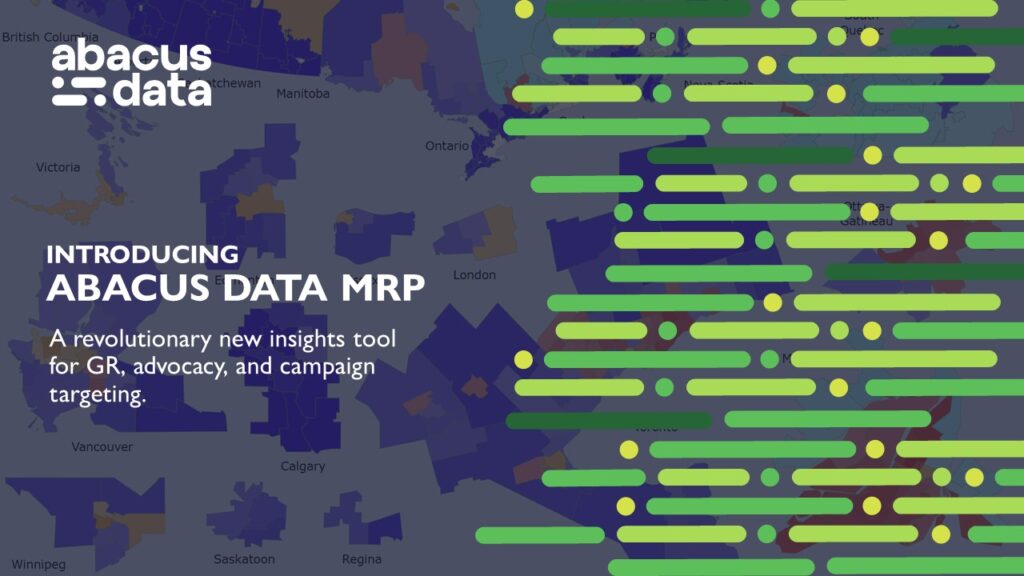
Additionally, regarding perceptions of immigration needs, 47% indicated their community requires fewer immigrants than the current influx, marking a 6-point increase since July (41%). In Ontario, 52% believe their community needs fewer new immigrants, compared to 36% in Quebec. It is noteworthy that Quebecers are more likely to say their community needs more immigrant than Canadians in other regions of the country (QC 25% vs. ROC 13%).
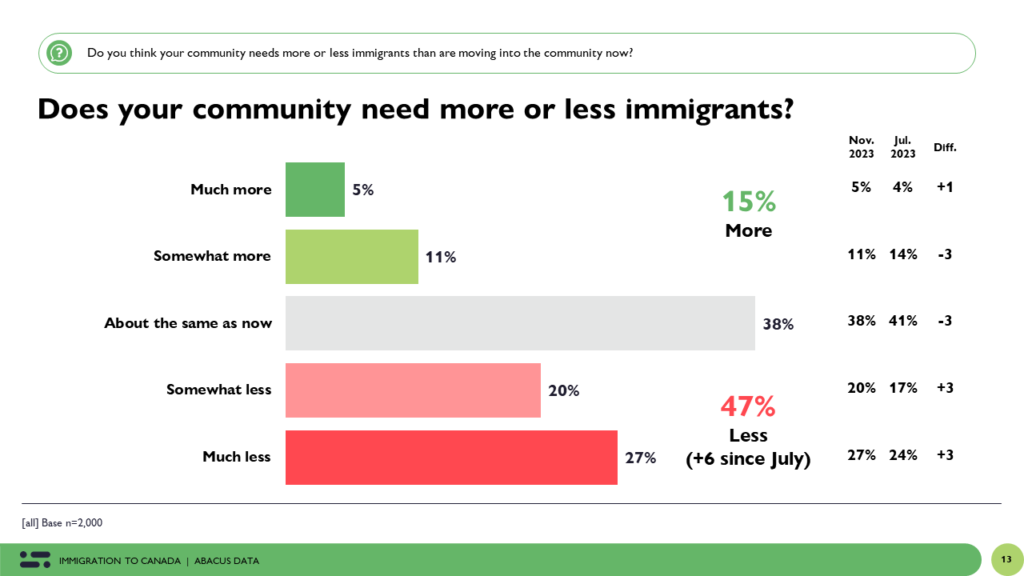
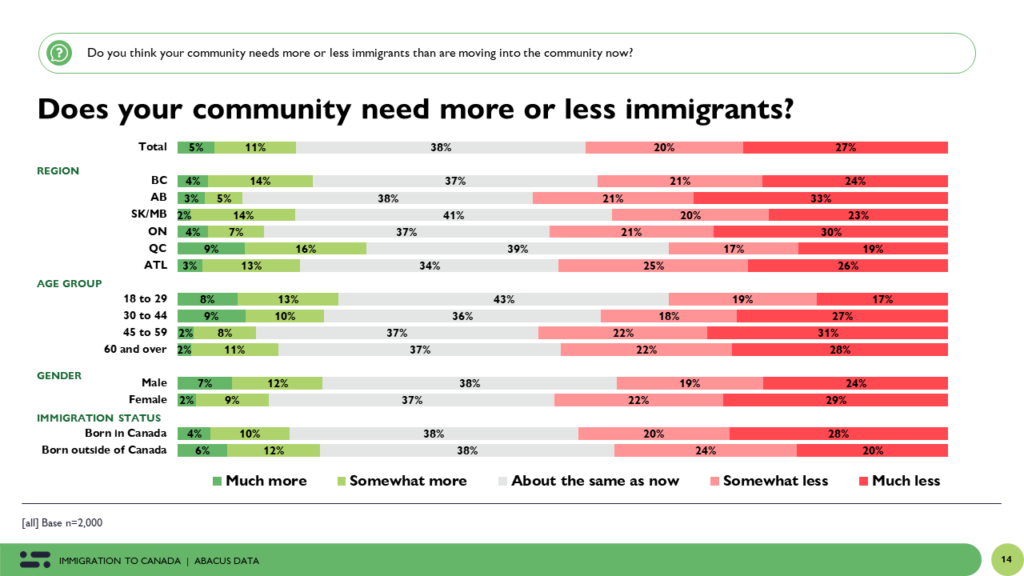
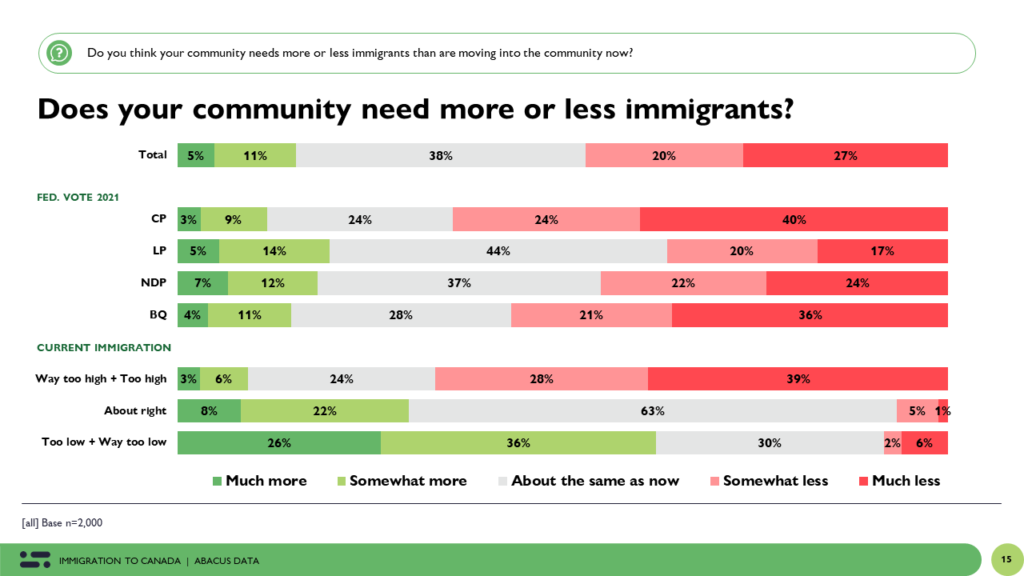
WHAT IS DRIVING PERCEPTIONS ABOUT IMMIGRATION?
Canadian opinion on immigration is quite rational. On the one hand, many Canadians believe that the immigration targets will have positive impacts on business investment, labour shortages, and economic growth. On the other, majorities believe the immigration targets will have a negative impact on housing affordability and availability, healthcare, and congestion.
We also note a noticeable decline in positive perceptions since July. Specifically, an increasing number of Canadians express doubts about positive impacts on the availability of workers, fostering economic growth, access to healthcare, crime and safety, congestion, and housing affordability. This dynamic shift underscores a changing narrative, as Canadians grapple with perceived negative repercussions of the influx of new immigrants on various aspects of their daily lives.
When examining key demographics, results reveal that younger Canadians exhibit a higher inclination to believe that the influx of new immigrants will yield positive impacts across various aspects. This trend is also observed among those who cast their votes for the Liberal Party in the 2021 elections. On the contrary, older Canadians, particularly those aged 45-59 and 60+, and individuals who supported the Conservative Party in the 2021 elections, are more prone to the belief that the arrival of new immigrants has predominantly negative effects across all areas.
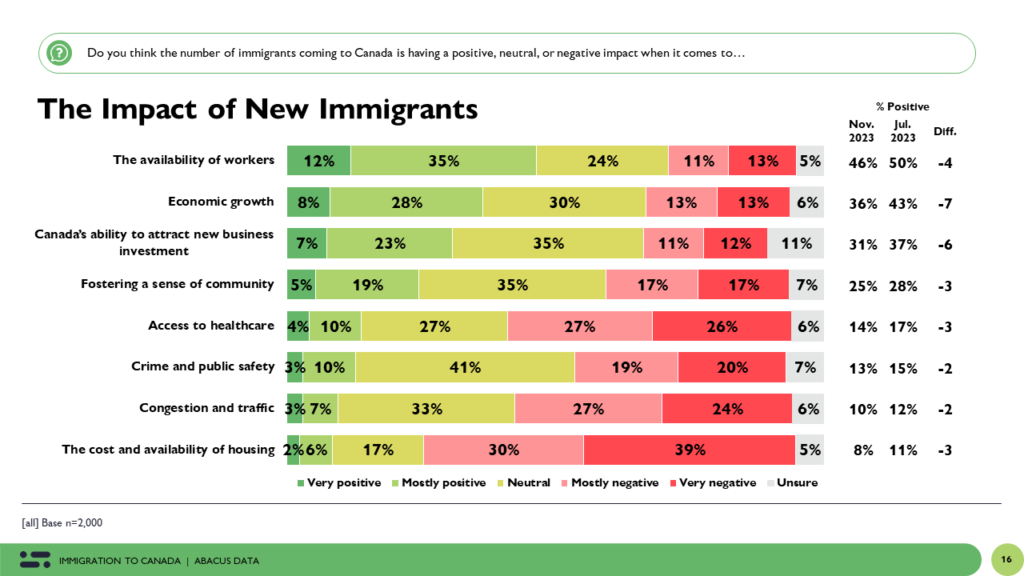
OVERALL SENTIMENT
Only 24% of Canadians hold the view that the present level of immigration is contributing positively to the country (vs. 28% in July), with a notable 43% expressing the belief that it is adversely affecting Canada (vs. 36% in July). The breakdown of these perspectives reveals that younger Canadians and Liberal Party voters tend to see immigration as having a positive on Canada, with 32% of those aged 18-29 and 35% of Liberal voters believing it makes the country better off. In contrast, older Canadians and Conservative Party voters are more inclined to perceive immigration as having negative consequences, with only 18% of those aged 45-49 and 18% of Conservative voters thinking it makes Canada better off.
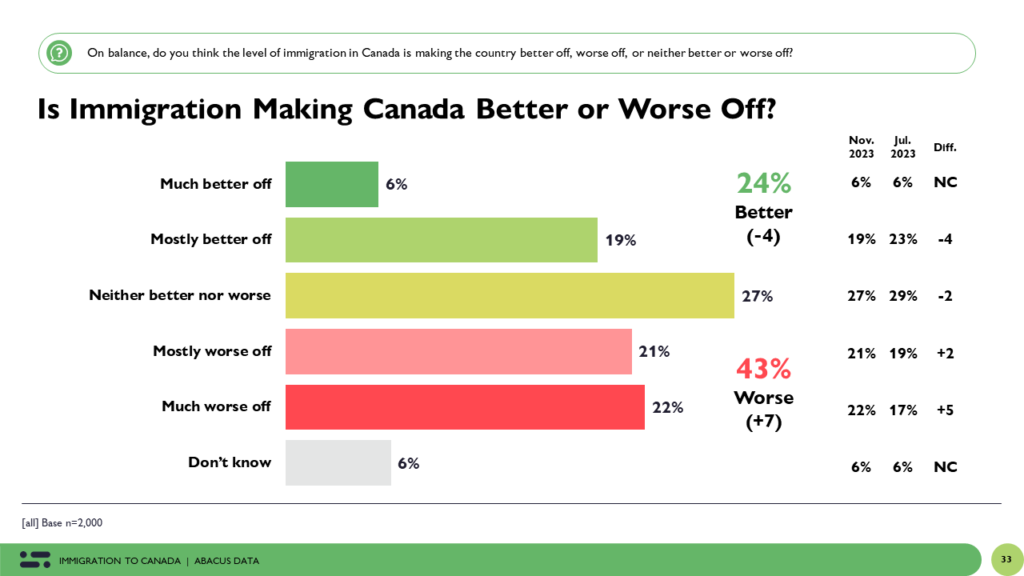
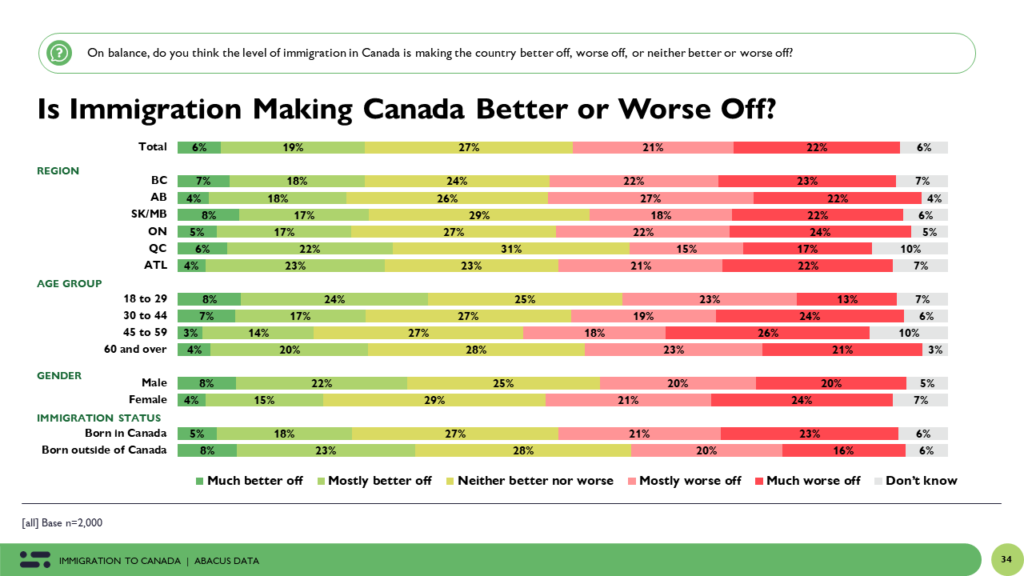
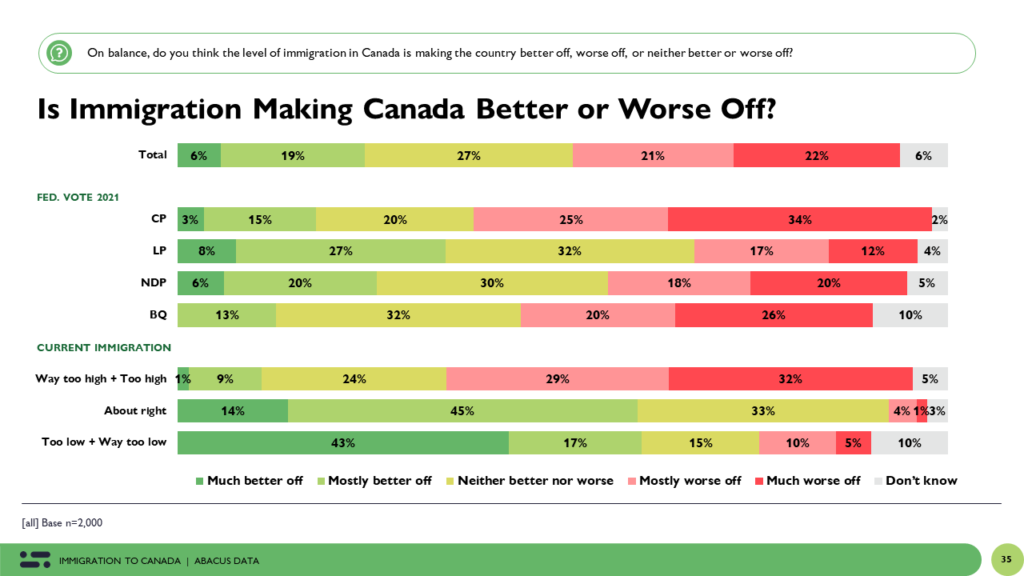
CONCLUSION
For a long time, it was conventional wisdom that Canada is unique among peer nations in our openness and acceptance of immigration. But as this survey highlights, conventional wisdom is being challenged. As a scarcity mindset sets in, concerns about the availability and affordability of housing, capacity of the healthcare system, and possibly a recession approach are causing people to reassess the appropriateness of such ambitious immigration targets. This survey highlights the fluidity and dynamism inherent in public opinion.
The intricate interplay between age, political affiliations, and perceptions of community impact highlights the imperative need for nuanced discussions on immigration policy that account for the diverse perspectives within the Canadian population.
- Public Discourse and Awareness: The survey highlights a lack of awareness among Canadians regarding the planned number of immigrants in 2024. Many Canadians will likely be surprised to learn the actual targets the federal government has set.
- Political Dynamics: The correlation between political affiliations and perceptions of immigration targets suggests that immigration policies and debates may become more prevalent as entrepreneurial political leaders look to respond to public pressure.
- Generational Divide: The survey highlights a generational divide in perceptions of immigration impact, indicating the importance of tailored strategies for communication and engagement across different age groups. Addressing concerns among older age groups and fostering understanding between generations will be crucial for creating a more cohesive societal perspective on immigration in Canada.
We will continue to track these opinions over time and explore other aspects of immigration.
METHODOLOGY
The survey was conducted with 2,000 Canadian adults from November 9 to 12, 2023. A random sample of panelists were invited to complete the survey from a set of partner panels based on the Lucid exchange platform. These partners are typically double opt-in survey panels, blended to manage out potential skews in the data from a single source.
The margin of error for a comparable probability-based random sample of the same size is +/- 2.19%, 19 times out of 20.
The data were weighted according to census data to ensure that the sample matched Canada’s population according to age, gender, educational attainment, and region.
This survey was paid for by Abacus Data Inc.
Abacus Data follows the CRIC Public Opinion Research Standards and Disclosure Requirements that can be found here: https://canadianresearchinsightscouncil.ca/standards/
ABOUT ABACUS DATA
We are the only research and strategy firm that helps organizations respond to the disruptive risks and opportunities in a world where demographics and technology are changing more quickly than ever.
We are an innovative, fast-growing public opinion and marketing research consultancy. We use the latest technology, sound science, and deep experience to generate top-flight research-based advice to our clients. We offer global research capacity with a strong focus on customer service, attention to detail, and exceptional value.
We were one of the most accurate pollsters conducting research during the 2021 Canadian election following up on our outstanding record in 2019.
Contact us with any questions.
Find out more about how we can help your organization by downloading our corporate profile and service offering.